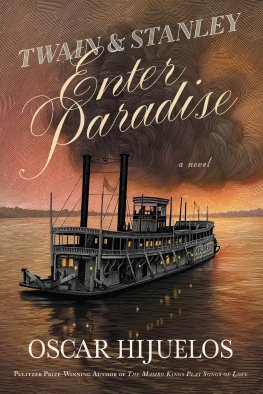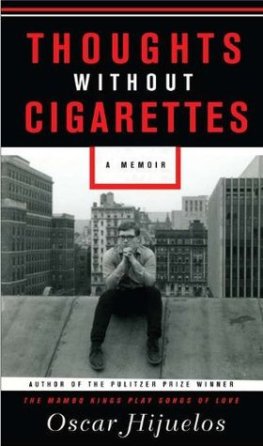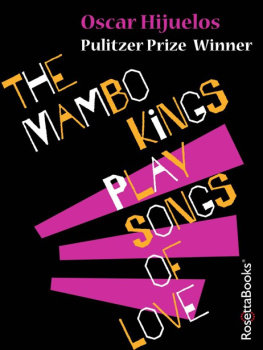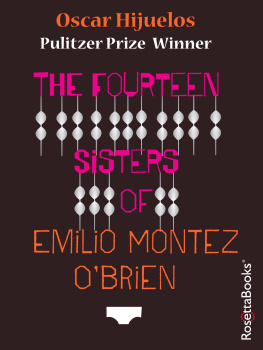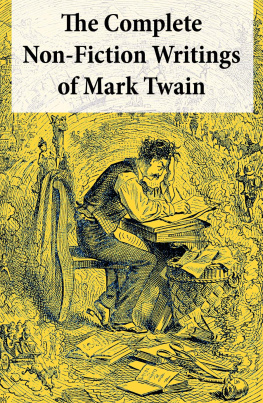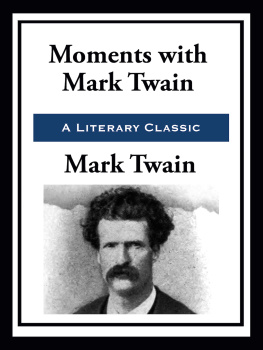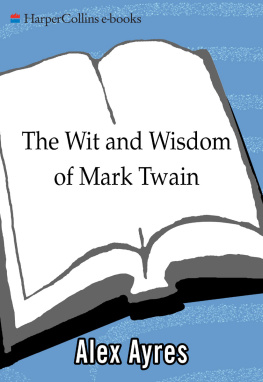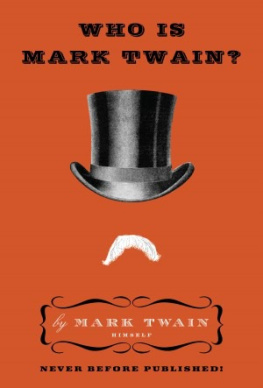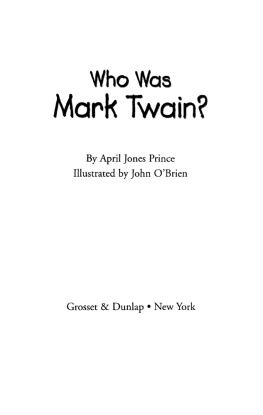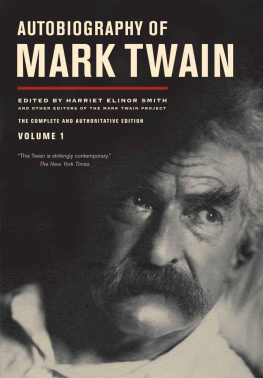Oscar Hijuelos
Twain & Stanley Enter Paradise
Twain & Stanley Enter Paradise is about the way the lives of Mark Twain and Henry Morton Stanley, two famous nineteenth-century Victorians, intersected. Frankly, I began writing it because their characters, as I researched them and from what I had deduced from their writings, seemed a perfect pairing. They in fact were good friends, even if (eventually) they held quite conflicting views about imperialism and the colonization of Africa. And there is something else: No one has ever written about their lives together, and that simply appealed to me.
The spine of the book involves the trajectory of their relationship: the way Stanley first came to know Twain as a newcomer to America from Wales in the late 1850s, their very similar careers as journalists in the American West, and finally, after each had achieved great fame at about the same time, how their friendship over the years proceeded.
It is a fact that Henry Stanleys wife, one Dorothy Tennant, was a highly regarded artist in nineteenth-century London. A flamboyant aristocrat of bohemian proclivities, she painted a number of portraits of Stanley, one of which is quite well known. Later, as I have configured the novel, she paints Twains portraits she has him sitting for her as he talks about the poignancies of his existence. Along the way, though he is certainly deeply in love with his wife, Livy, a quite frail, constantly ill woman, Twain, tired of his lifes adversities, becomes hypnotized, as it were, by Stanleys wife, a voluptuous seductress at heart, whom he came to dote upon. In that way it is a triangle, with Twain, as I imagine him, unconsciously falling in love with Tennant despite her many eccentricities and his unflagging loyalty to his wife.
I am also fairly convinced that, in London of the 1890s, when Twain and his wife were grieving over the tragic loss of their daughter Susy, it was Dorothy Tennant whose brother-in-law, Frederic Myers, was the head of Londons Society for Psychical Research who took them around to various mediums and sances. To help ease Livys suffering, and out of curiosity, Twain played along, but rather skeptically so. Despite an earlier experience with the supernatural namely, a premonition he once had as a riverboat pilot on the Mississippi, foretelling, in precise detail, the death of his younger brother, Henry, in 1858Twain doesnt buy any of it. When confronted with a spiritualist who seemingly channels their daughters ghost, he still refuses to believe, as Dorothy Tennant certainly does, that there might be something to such a phenomenon. Not to throw around ten-dollar words, but thematically speaking, the novel pursues that dichotomy in Twain. Recording that premonition about his brothers death extensively in Life on the Mississippi, and often retelling that story during his life, he remained in denial, and rather doggedly so, of the supernatural: And yet, at the same time, he somewhat envied people, like Dorothy Tennant, who, however deluded, took solace in such beliefs.
Then there is the notion of paradise, as alluded to in the title. For Twain it came down to his memories of his fairly happy, carefree youth, the sweet energies of which he put into his most famous book, The Adventures of Huckleberry Finn. (I have Stanley taking this book with him on his 1886 expedition to rescue Emin Pasha in Africa, a notion I latched on to based on a statement Twain once made to that effect.) Twains paradise also entailed his love for a family that, as the years went by, simply vanished two of his three daughters died, then his wife; I find it a supreme irony that a man who brought so much joy into the world, and whose own beginnings had been so happy, suffered so unfairly. What paradise remained for him came down to what he had captured so beautifully in his books and in his lingering friendships.
For Stanley, whose life began so badly his childhood in Wales spent in a workhouse as a ward of the British state; his dangerous but successful enterprises on behalf of King Lopold in Africa eventually, perhaps unfairly, linked to the atrocities committed in that region for rubber and ivory tusksthis paradise came belatedly, in his later years. In the mid-1890s, Stanley and his wife adopted a son and retreated to a country estate in Surrey where Twain and Livy stayed as guests on at least three occasions. (To quote Twain himself, Stanleys was the last country estate in England I ever visited.) There, after a lifetime of wanderings, he found his contentment in the company of his affectionate adoptive son. Of course, even Stanleys autumnal happiness had its limitations. Shunned by polite society over his African exploits, he became a recluse save for the company of certain friends such as Mark Twain. Plagued by recurring bouts of malaria and other Africa-borne diseases, he eventually entered his decline, his only solace coming not from any nostalgia for the past but from the love of his little family, the achievement of a lifelong solitarys dream.
Of course, much more happens. There is Twains failure to persuade Stanley to write a book for his Charles L. Webster and Company publishing house upon his triumphant return from Africa in 1889, a fiasco that their friendship somehow survived; their mutual admiration for each other as writers (for a time, with Kipling, they were the most famous authors in the English-speaking world); their bouts of bad health (it was Twain who put Stanley onto the dubious holistic wonder cure known as Plasmon); and their mutual hatred of slavery Twain was the head of an antislavery society for many years, and Stanley, as far as he was concerned, had done much to limit slavery in Africa, lecturing all over England for that cause. There were also their public lectures together and the soirees they attended in London, Twain at one point introduced Stanley to a promising young Scottish writer by the name of Bram Stoker, author of Dracula, and Stanley introduced Twain to one of his wifes American friends, a demure fellow named Henry James, who often came to their house and met Twain on several occasions.
However, as a writer best known for certain subjects, I also intend the book to give a glance at nineteenth-century Cuba, mainly through the journeys the men made in their lifetimes to that island. Stanley went there in the early 1860s, during the American Civil War, a time when Cuba, with its strong Havana New Orleans sugar-tobacco trade and many Southern inhabitants, seemed an extension of the South. (Had the Confederates won the war they would have annexed Cuba as a state.) In that regard, Stanleys travels there draw a picture of Havana circa 1864 or so, when the Confederates had filled the warehouses of the harbor with ammunitions and supplies and when surly Southern brigades, knowing how the war was going, stoically manned the docks. Twain journeyed there in 1902, in the aftermath of the Spanish-American War, and having invited Stanley along by way of a letter to England Stanley was too ill to make the transatlantic voyage he toured the island from one end to the other aboard a yacht, the last great adventure of his life (Twain was in his late sixties by then).
The novel extends from the late 1850s to 1910 and somewhat beyond and before, skirting back and forth in time. It culminates in Twains last visit to London, in 1907. Stanley, a little more than five years younger, had died in 1904, and Twain, in England to receive an honorary doctorate in letters from Oxford, spent an afternoon with Dorothy Tennant for tea. (Its in the records.) She had remarried by then, to the very surgeon who had attended to Stanley in his last days, but the house remained filled with remembrances of her late husband. After some niceties, tea served, she persuaded Twain to sit for her one last time, for a fast wishy-wash of a portrait. And so Twain, still enchanted by the lady, who had not aged a day since he first met her in 1890 and for whom he still felt some furtive longings, sat for her again. What did they talk about? Thats something the novel will tell.

